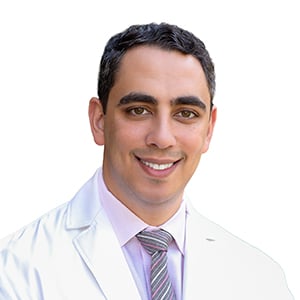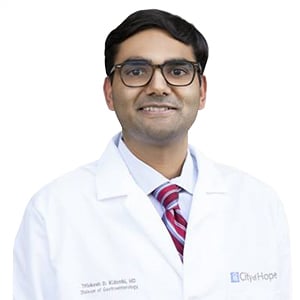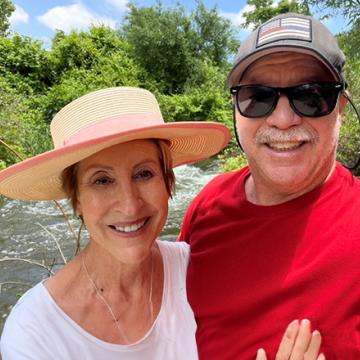Colorectal Cancer
Cancers of the colon and the rectum are the fourth-most commonly diagnosed cancers in the U.S. Because of their similarities, they are merged into a single category known as colorectal cancer. Although this disease is the second-leading cause of cancer death, thanks to more rigorous screening and regular treatment advances, the percentage of deaths from colorectal cancer continues to drop. In addition to treating colorectal cancers, our team offers care for many noncancerous colorectal conditions.
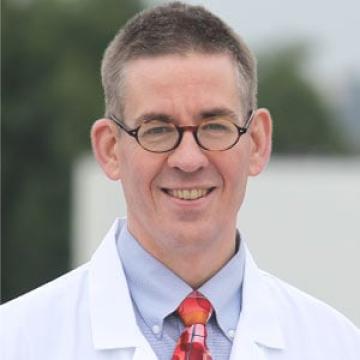
Nearly 151,000 people will get colorectal cancer in the United States each year. About 1 in 21 men and 1 in 23 women will get the disease during their lifetimes. Colorectal cancer is the third leading cause of cancer death in women and the second leading cause of cancer death in men. However, the colorectal cancer survival rate has been climbing steadily over the last few decades.
Without symptoms, polyps containing cancer cells can stay lodged in the colon wall for years. Therefore, screening increases the chances of catching colorectal cancer early, before it has spread and when it is more likely to be cured. At City of Hope, we offer three types of screenings to detect colorectal cancer: colonoscopy, stool DNA testing and genetic screening.
City of Hope’s approach to treating colorectal cancer focuses on precision medicine. That means we apply precise and minimally invasive surgical techniques and test individual cancer cells to find drug combinations that would work best for your specific cancer.
Colorectal cancer is a highly complex disease that can act in many different ways in the body. Clinical trials at City of Hope focus on those differences — and designing therapies that affect how colorectal cancer develops, progresses and spreads.
Getting treated for colorectal cancer at City of Hope means you are steps away from labs where our researchers develop new treatments every day.
When you come to City of Hope, you automatically gain access to an unparalleled array of support services to help you and your loved ones take each step during and after your colorectal cancer treatment.


City of Hope is internationally recognized for its research and breakthrough treatments, and designated as a comprehensive cancer center, the National Cancer Institute’s highest distinction. U.S. News & World Report has ranked City of Hope as a “High Performing Hospital” for colon cancer surgery and as one of America’s top cancer hospitals overall for more than a decade. In addition to our main campus in Duarte, California, our patients now have access to the best in comprehensive cancer care at locations across the United States.
Colorectal Cancer Program Highlights:
-
World-renowned colorectal surgeons with extensive experience in the entire spectrum of state-of-the-art techniques. Many of these options tend to be gentler on patients’ bodies, including robotic and laparoscopic surgeries. Others push the envelope of radical surgery when the pursuit of cancer cure demands it. Learn more about our Division of Colorectal Surgery.
-
Procedures that are performed with greater precision through smaller incisions, for less pain and faster recovery
-
Surgeons who know how to do everything possible to preserve the sphincter muscle and avoid a permanent colostomy
-
Colorectal surgeons specializing in complicated, advanced-stage or recurrent cancers by teaming up with our renowned liver surgery team to perform combined colon and liver operations, or with our distinguished urologists and gynecologists for combined pelvic operations affecting the rectum, the bladder and the prostate or female organs
-
Ultraprecise radiation and chemotherapy to target tumors while preserving healthy tissue
-
Genetic targeting used to figure out a tumor’s specific biology and to design treatments to stop it from growing
-
Expertise in hereditary/familial cancer syndromes, with next-generation DNA sequencing to define the current and future risks for all potentially affected family members
-
Hyperthermic intraperitoneal chemotherapy (HIPEC) and pressurized intraperitoneal aerosolized chemotherapy (PIPAC), a complex treatment that involves surgically removing widespread cancer and delivering heated chemotherapy directly to the abdomen
-
Supportive care that continues long after treatment ends, including helping you and your family adjust to post-treatment diet and lifestyle changes
At City of Hope, we are experts at treating advanced and recurrent disease. We frequently see complicated colon and rectal cancer cases that others do not want to address: Where others stop, we’re just getting started. Treatments happen just steps away from groundbreaking research and clinical trials — right on City of Hope’s highly sophisticated clinical and research campus — that could directly impact how we treat your cancer.
When you seek help from City of Hope, we are not just focused on leading-edge care and innovation. We are working to make you whole again.
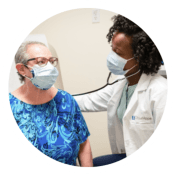
With superior survival outcomes in the Greater Los Angeles region for all stages, City of Hope’s aptitude for treating colorectal cancer stands on its own.

Our developments in the areas of breakthrough cancer drugs, bone marrow transplants and CAR T cell therapy are recognized internationally.

Our leadership in research and innovation continually enhances our ability to provide novel and differentiated approaches to cancer care.
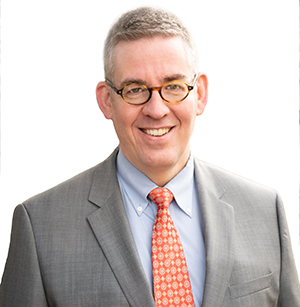
Andreas M. Kaiser, M.D., professor and chief, Division of Colorectal Surgery, Department of Surgery, specializes in colorectal diseases.
Mark Hanna, M.D., is an assistant clinical professor in the Division of Colorectal Surgery, Department of Surgery.

Lily Lai, M.D., is a surgical oncologist and professor in the Division of Colorectal Surgery, Department of Surgery.
Kurt A. Melstrom, M.D., is an associate clinical professor in the Division of Colorectal Surgery, Department of Surgery.
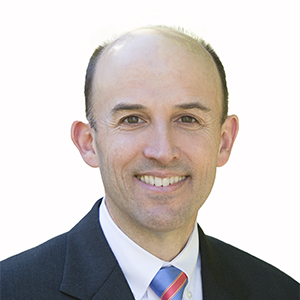
Stephen M. Sentovich, M.D., M.B.A., is a colorectal surgeon and a clinical professor in the Division of Colorectal Surgery, Department of Surgery.
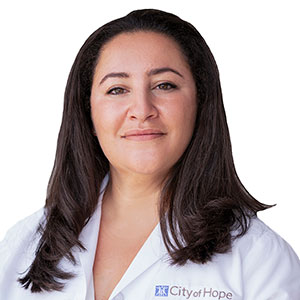
Yasmin Zerhouni, M.D., is an assistant clinical professor in the Division of Colorectal Surgery, Department of Surgery.
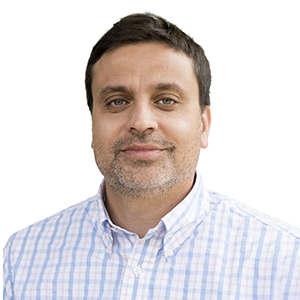
Aziz Ahmad, M.D., is a surgical oncologist in City of Hope's Glendora location.
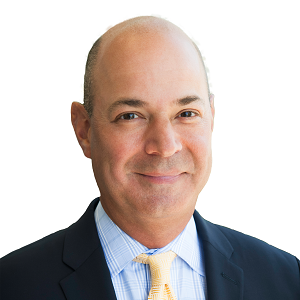
Moshe Faynsod, M.D., is surgical oncologist at City of Hope ǀ South Bay in Torrance, California.
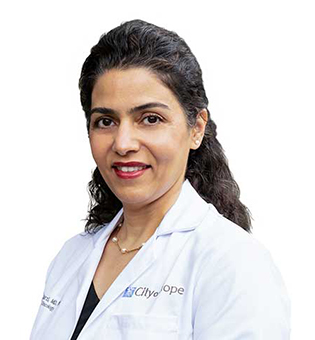
Afsaneh Barzi, M.D., Ph.D., is a medical oncologist at City of Hope.
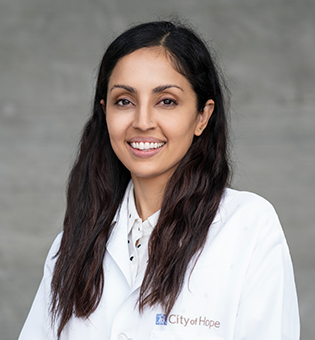
Gagandeep Brar, M.D. is an assistant clinical professor in the Department of Medical Oncology & Therapeutics Research.

Yi-Jen Chen, M.D., Ph.D., is a radiation oncologist specializing in gastrointestinal cancers, gynecological cancers and esophageal cancers.
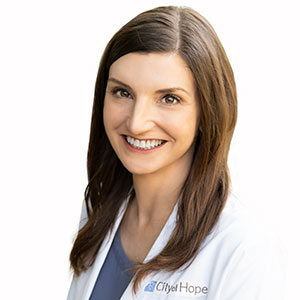
Heather McGee, M.D., Ph.D., is an assistant professor in the Department of Radiation Oncology and Department of Immuno-Oncology at City of Hope.
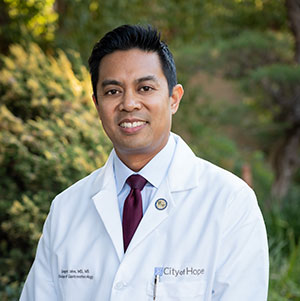
Gregory Idos, M.D., M.S., is a gastroenterologist at City of Hope.
Trilokesh Kidambi, M.D., a gastroenterologist with a specialty colorectal cancer screening at City of Hope, near Los Angeles.

Jonathan Kessler, M.D., is a interventional radiologist specializing in colon, liver, kidney cancers.
